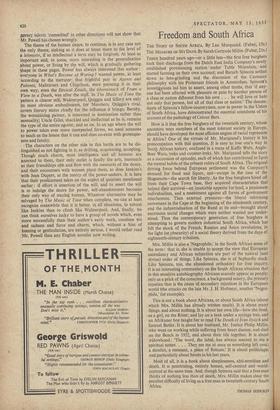Freedom and South Africa
THREE hundred years ago—or a little less—the first free burghers took their discharge from the Dutch East India Company's newly established provisioning station' under Table Mountain, and started farming on their own account; and Baruch Spinoza settled down to lens-grinding and the discussion of the Cartesian philosophy with his Protestant friends in Amsterdam. Spinoza's investigations led him to assert, among other truths, that 'if any- one has been affected with pleasure or pain by another person of a class or nation different from his own . . . he will love or hate not only that person, but all of that class or nation.' The descen- dants of Spinoza's fellow-countrymen, now in power in the Union of South Africa, have demonstrated the essential soundness of his account of the pathology of Colour Bars.
How is it that the free burghers of the twentieth century, whose ancestors were members of the most tolerant society in Europe, should have developed the most efficient engine of racial repression in Africa? One of the virtues of Mr. Marquand's history is his preoccupation with thi4 question. It is easy to' lose one's way in SoutD African history, confused in a maze of Kaffir Wars, Anglo- Boer Wars, treks and counter-treks. Mr. Marquand tells the story as a succession of episodes, each of which has contributed to form the mental habits of the present rulers of South Africa. The original driving force' behind European ,settlement was the Company's demand for food and liquor, not—except in the case of the Huguenots—the search for liberty. As the free burghers hived off from their Cape Town base, they acquired characteristics that helped their survival—an insatiable appetite for land, a passionate individualism, and a resentment against all forms of government interference. Then external pressures—the liberal reforming movement in the Cape at the beginning of the nineteenth century, and the industrialisation of the Rand at its end—brought about enormous social changes which were neither wanted nor under- stood. Thus the contemporary generation of free burghers is attempting to govern modern industrial South Africa, which has felt the shock of the French, Russian and Asian revolutions, in the light (or obscurity) of a social theory derived from the days of eighteenth-century tribalism. •
Mrs. Millin is also a 'Negrophile,' in the South African sense of the term : that is, she is unable to accept the view that. European ascendancy and' African subjection are part of the natural (and divine) order of things. Like Spinoza, she-is of Sephardic stock. Like Spinoza, too, she abandoned orthodoxy for free inquiry. It is an interesting commentary on the South African situation that in this sensitive autobiography Africans scarcely appear, as people; only as a prick of the conscience, a background misery, the primary injustice that is the cause of secondary injustices in the European world (the attacks on the late Mr.,J. H. Hofmeyr, another 'Negro- phile,' for example).
This is not a book about Africans, or about South Africa (about which Mrs. Millin has already written much). It is about many things, and about nothing. It is about her own life—how she lived, as a girl, on the River; and lay on a tank under a syringa tree, and an Afrikaner boy taught her to read The Death of Ivan Ilyitch and Samuel Butler. It is about her husband, Mr. Justice Philip Millin, who went on working while suffering from heart disease, and died on the Bench in 1952, and about their life together. It is about widowhood : 'The word, the label, has always seemed to me a spiritual suttee. . . . They see me at once as something left over, a derelict, a remnant, a piece of flotsam.' It is about politiciaps, and particularly about Smuts in his last years.
Most of all, it is a book about sleeplessness, anti-semitism and death. It is penetrating, entirely honest, self-centred and • world- centred at the same time. And, though Spinoza said that a free man thinks of nothing less than of death, Mrs. Millin makes clear the peculiar difficulty of living as a free man in twentieth-century South Africa.
THOMAS HODGKIN


































 Previous page
Previous page